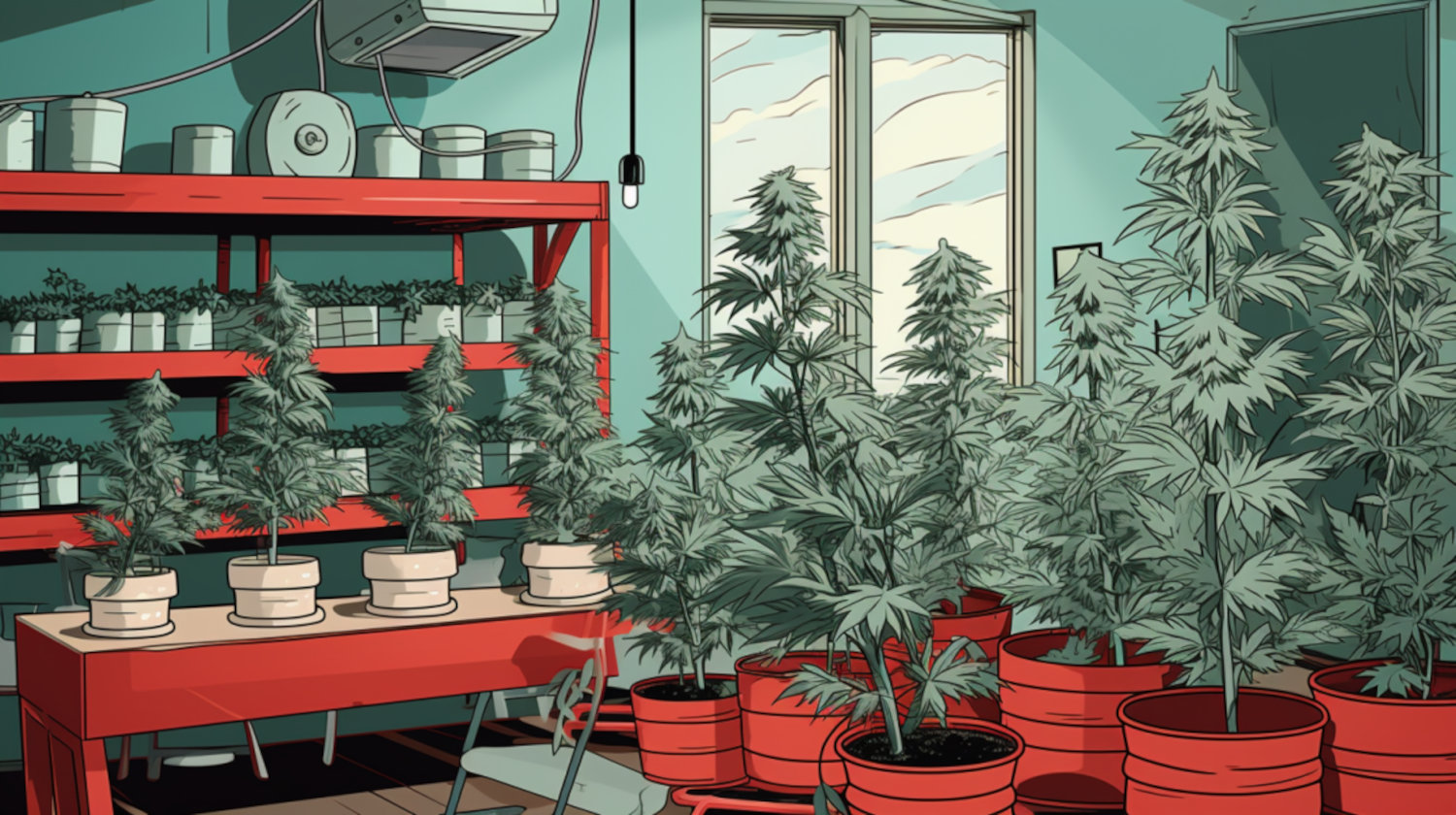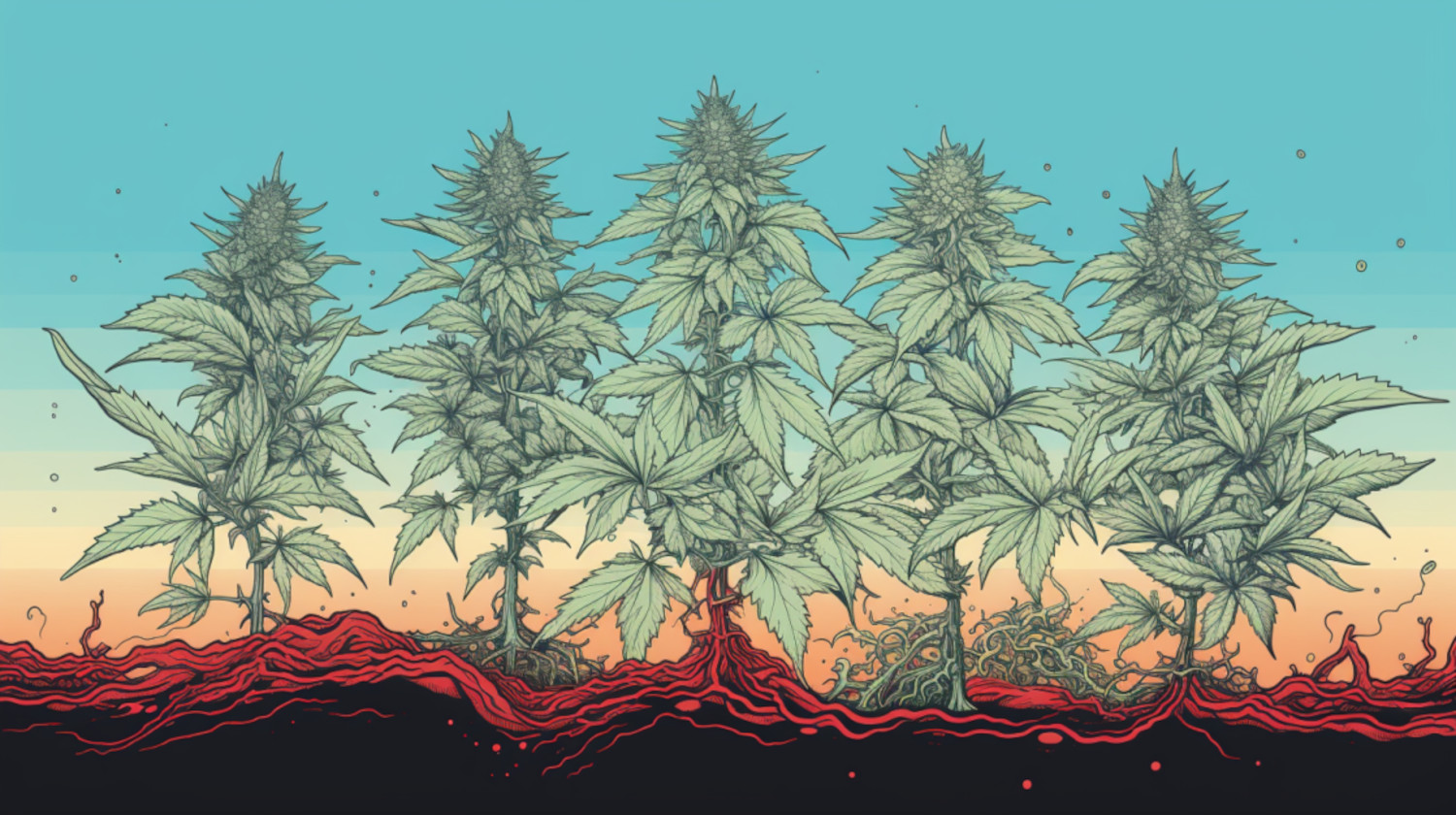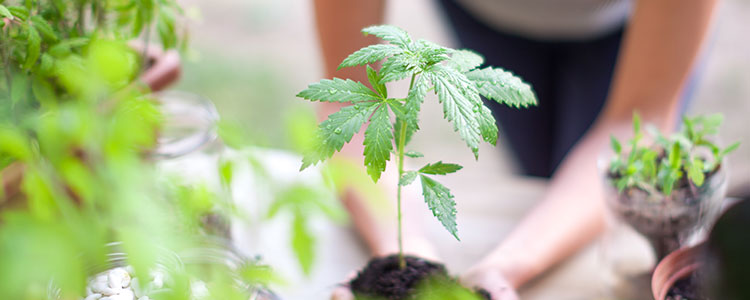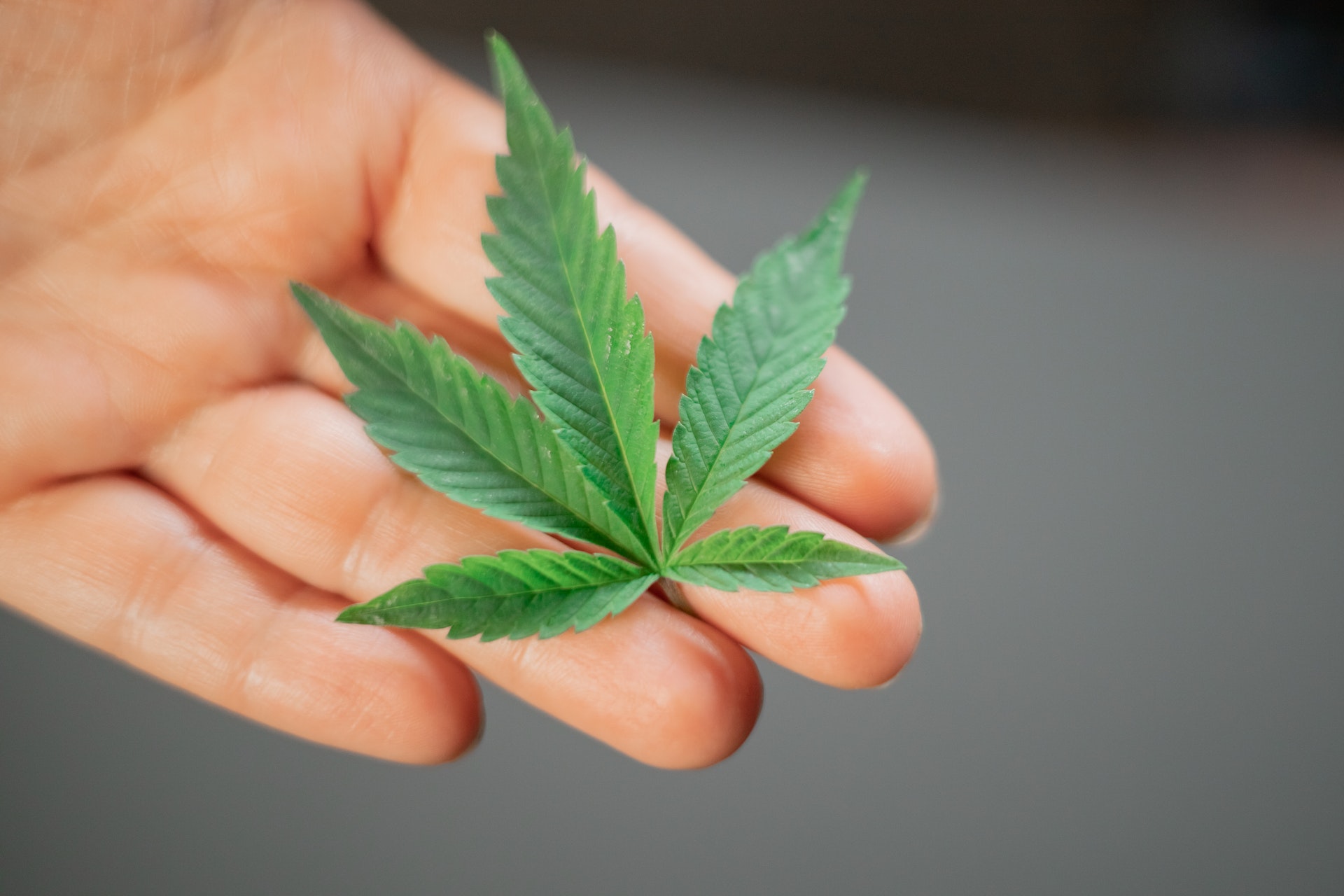Growing cannabis at home is more popular than ever, and for good reason! From greater control over strains and potency to the satisfaction of nurturing a thriving plant from seed to harvest, nothing quite does it like growing it yourself. Nevertheless, becoming a successful cannabis gardener can be a bit intimidating, especially for newcomers.
As any experienced grower will tell you, cannabis plants are not all that different from us when it comes to their dietary needs. Just as we require a balanced diet to stay healthy, cannabis plants rely on a carefully curated menu of nutrients, one of the most important being nitrogen.
Why Do Cannabis Plants Need Nitrogen?
Nitrogen, abbreviated as "N" on the periodic table, is a fundamental component of many metabolites that play central roles in plant development and structure. It's similar to the cornerstone of a building, providing essential support for the entire plant structure.
Here's why cannabis plants need nitrogen and how it affects their growth:
1. Building Blocks of Life
Nitrogen is a primary building block for many vital compounds within the plant. These include nucleic acids (DNA and RNA), amino acids (the building blocks of proteins), and the photosynthetic pigment chlorophyll.1 These substances are the very essence of life for cannabis plants, driving processes like growth, reproduction, and energy production.
2. Powering Photosynthesis
Chlorophyll, which contains nitrogen, is responsible for the green color in plants and is necessary for photosynthesis — the process by which plants convert sunlight into energy. Without adequate nitrogen, chlorophyll production diminishes, affecting a plant's ability to harness sunlight effectively. As a result, growth can be stunted, and the plant's overall health may suffer.
3. Cannabinoid Content and Flower Growth
Nitrogen's role goes beyond mere sustenance; it also has a profound impact on the quality and quantity of the cannabinoids that cannabis enthusiasts cherish.
Research suggests that the availability of nitrogen can influence cannabinoid content. Interestingly, increased nitrogen supply can lead to reduced cannabinoid and terpenoid production.2 While this may sound counterintuitive, it's a delicate balance — the plant's energy resources are redirected toward vegetative growth when nitrogen levels are high, often at the expense of flower development. Conversely, optimal nitrogen levels are needed to ensure vigorous growth and high yields of quality flowers.
Symptoms of Nitrogen Deficiency in Plants
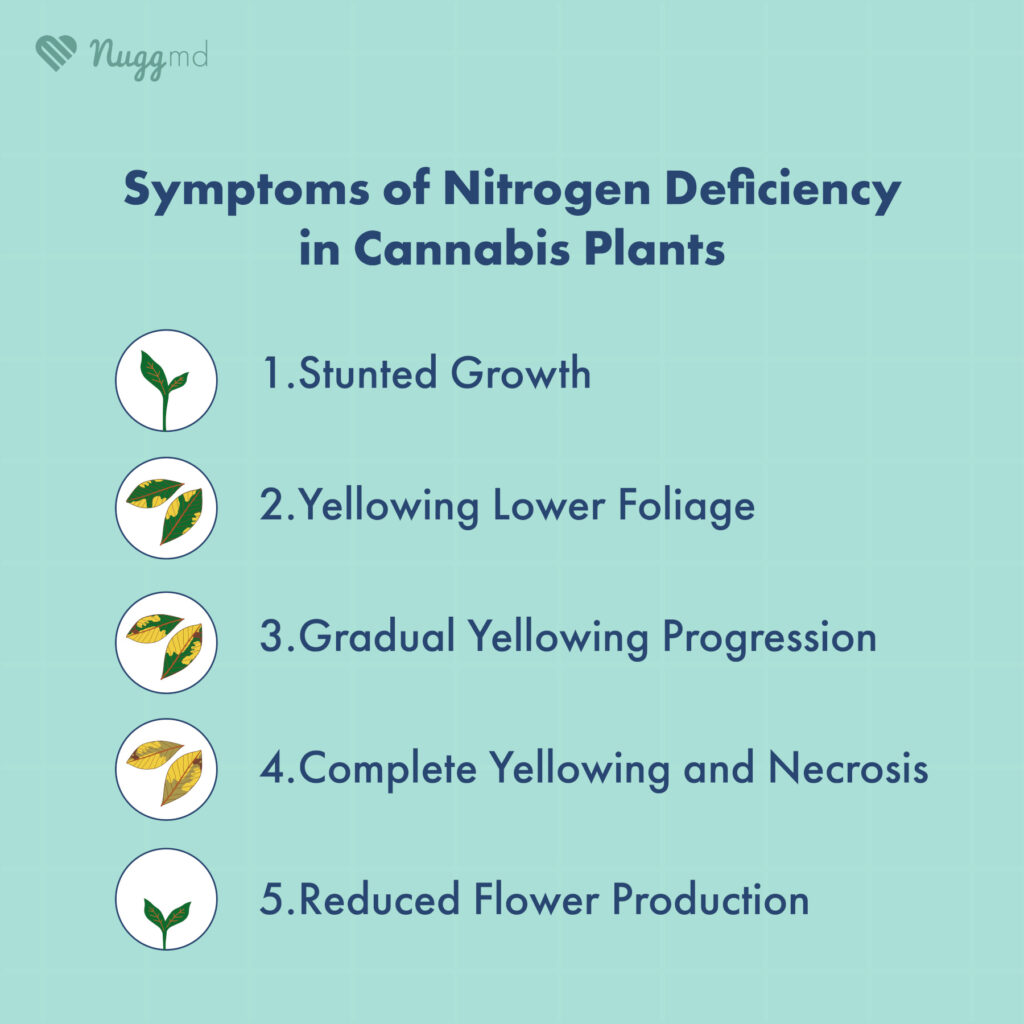
Distinguishing nitrogen deficiency in cannabis plants is a fundamental skill for any cultivator, whether just starting or a seasoned veteran.
Understanding the signs and signals of its deficiency is crucial in preventing setbacks and ensuring the well-being of your cannabis crop.3
1. Stunted Growth
One of the earliest indications of nitrogen deficiency is a noticeable reduction in the overall growth rate of your cannabis plants. Affected plants often appear smaller and less robust and may exhibit a general lack of vigor compared to their healthy counterparts of the same age. This stunted growth warns that something is amiss in the nutrient department.
2. Yellowing Lower Foliage
Nitrogen deficiency often presents as a subtle yellowing or paleness of the lower leaves, typically starting with the oldest ones near the base of the plant. These lower leaves are the initial casualties in the battle for nutrients, as the plant redistributes its limited resources to prioritize new growth. As a result, they become the canaries in the coal mine, signaling that the plant's nitrogen reserves are running low.
3. Gradual Yellowing Progression
As the deficiency persists, the yellowing intensifies and progresses upward from the lower leaves to the middle foliage. This gradual ascent of yellowing is a hallmark of nitrogen deficiency. Observing this pattern can help you distinguish it from other nutrient deficiencies or environmental stressors.
4. Complete Yellowing and Necrosis
In advanced stages of nitrogen deficiency, the affected leaves may turn entirely yellow and, in severe cases, become necrotic or die off. The plant often sheds these necrotic leaves as it reallocates its dwindling resources to more critical areas of growth. The loss of these leaves can be a critical blow to your cannabis plant's overall health and productivity.
5. Reduced Flower Production
Nitrogen deficiency not only affects vegetative growth but also impairs flower production. The plant redirects its energy away from developing buds and flowers to sustain its own survival. This can lead to decreased yields and lower-quality harvests.
Cannabis Nitrogen Deficiency: Why It's a Big Problem
Nitrogen deficiency in cannabis plants is far more than a minor setback; it can significantly impact your crop's overall health, quality, and yield in the following ways:
1. Poor Overall Growth
One of the most immediate and conspicuous consequences of nitrogen deficiency is the stunting of your cannabis plants. Depending on the severity of the deficiency, your plants may appear significantly smaller and less robust. Younger leaves, in particular, bear the brunt of this inhibition, leading to a disproportionate impact on the plant's overall structure.
2. Impaired Leaf Development
Nitrogen plays a pivotal role in leaf development. In cases of deficiency, leaf growth is severely inhibited. Leaves may become smaller, misshapen, and pale in color. This impairment hampers the plant's ability to capture sunlight efficiently and perform photosynthesis, vital for energy production and overall plant health.
3. Reduced Shoot Growth
Longitudinal shoot growth, or the upward extension of stems and branches, is also hindered by nitrogen deficiency. Cannabis plants with nitrogen deficiency may not reach their intended height and fail to produce the lush canopy needed for optimal light exposure and air circulation.
4. Decreased Yields
Ultimately, the most pressing concern for many cannabis cultivators is reduced yields. Nitrogen deficiency can directly translate into lower harvest quantities, resulting in less product for consumption or distribution. For commercial growers, this can mean a significant financial setback.
What Causes Nitrogen Deficiency in Weed Plants?
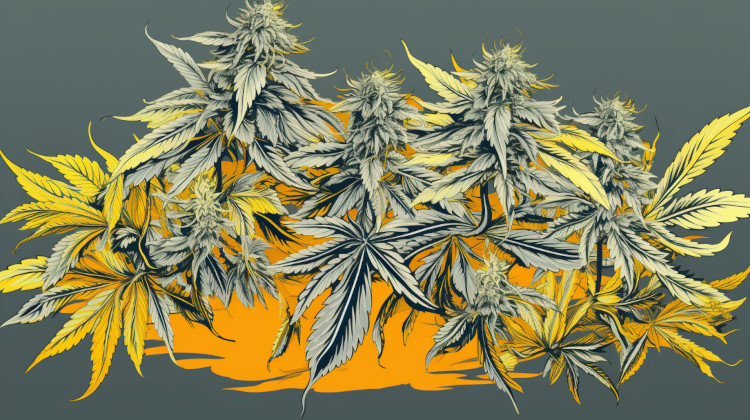
Understanding the root causes of nitrogen deficiency in cannabis plants is necessary for effective prevention and management. Nitrogen deficiency can occur due to many factors, and recognizing these common causes is key to addressing the issue.
1. Inadequate Soil Nutrients
The primary cause of cannabis nitrogen deficiency is often linked to the soil in which cannabis plants are grown. If the soil lacks sufficient nitrogen content or is not readily available to the plant due to imbalanced pH levels, cannabis plants may struggle to access this vital nutrient.
2. Overdiluted Fertilizers
Sometimes, well-meaning gardeners can inadvertently create nutrient imbalances by over-diluting fertilizers or using inappropriate nutrient ratios. A lack of nitrogen in the fertilizer mix can directly contribute to nitrogen deficiency in your cannabis plants.
3. Poor Drainage
Soil that doesn't drain well can exacerbate nitrogen deficiency. Excess water can leach nitrogen from the root zone, making it inaccessible to the plants. Inadequate drainage can also create root rot conditions, further hindering nutrient uptake.
4. pH Imbalance
Soil pH levels can significantly affect nutrient availability. When soil pH is too high or too low, it can impede the plant's ability to absorb nitrogen and other essential nutrients. Continuously monitor and adjust the soil's pH to ensure it falls within the optimal range for nutrient uptake (between 6.0 and 7.0).
5. Soil Compaction
Compacted soil restricts root growth and oxygen intake, making it difficult for cannabis plants to access nutrients, including nitrogen. Compacted soil can result from excessive foot traffic, heavy equipment use, or poor soil preparation.
6. Nitrogen Loss Through Runoff
In outdoor cannabis cultivation, excessive rain or irrigation can lead to nitrogen runoff. This washes away nitrogen from the root zone, depriving the plants of this essential nutrient.
How to Fix Nitrogen Deficiency in Plants
If you want happy and healthy cannabis plants, you'll need to address nitrogen deficiency as soon as you see it. Fortunately, you can employ several effective strategies to fix your plants with nitrogen deficiency, depending on the specific circumstances and causes.
1. Amend the Soil
If soil quality is the primary cause of nitrogen deficiency, amending the soil is a long-term solution. Adding organic matter like compost or well-rotted manure can increase nitrogen levels. Nitrogen-rich fertilizers or soil amendments with balanced nutrient ratios can provide immediate relief.
2. Adjust pH Levels
You should focus on pH correction if a pH imbalance contributes to nitrogen deficiency. Adding pH-adjusting materials like lime (to raise pH) or sulfur (to lower pH) can help create a more favorable environment for nutrient uptake, including nitrogen.
3. Use Nitrogen-Rich Fertilizers
Opt for fertilizers specifically formulated to address nitrogen deficiency for a quick nitrogen boost. These fertilizers contain higher nitrogen levels to meet the immediate needs of your cannabis plants. Foliar sprays with nitrogen can also provide rapid relief, as they are absorbed directly through the leaves.
4. Use Organic Nitrogen Sources
Organic growers can turn to nitrogen-rich organic amendments like blood, fish, or feather meals. These slow-release sources gradually provide nitrogen to the plants, promoting steady and sustained growth.
5. Adjust Watering Practices
To combat nitrogen loss through runoff, be mindful of your watering practices. Avoid excessive irrigation and ensure proper drainage to prevent nitrogen from being washed away from the root zone.
6. Stage-Specific Strategies
Different stages of cannabis growth have varying nutrient requirements. During the vegetative stage, plants generally require more nitrogen for lush foliage. In contrast, the flowering stage benefits from gradually reducing nitrogen levels to promote bud development and resin production. Adjusting your nutrient regimen to suit these growth stages can help maintain a balanced nutrient profile.
7. Monitor and Adjust
Regular monitoring of your cannabis plants' health is crucial. Observe for signs of nitrogen deficiency and adjust your nutrient management accordingly. This proactive approach can prevent the issue from recurring.
The quickest strategy to address nitrogen deficiency often involves using nitrogen-rich fertilizers or foliar sprays. These provide an immediate nutrient boost to your plants. However, it's essential to remember that long-term solutions, such as amending the soil or adjusting pH levels, are equally important to prevent future deficiencies.
Ultimately, the choice of strategy should consider the specific circumstances, including the cause of nitrogen deficiency, the growth stage of your cannabis plants, and your preferred cultivation methods (organic or conventional).
How to Prevent Nitrogen Deficiency in Weed Plants
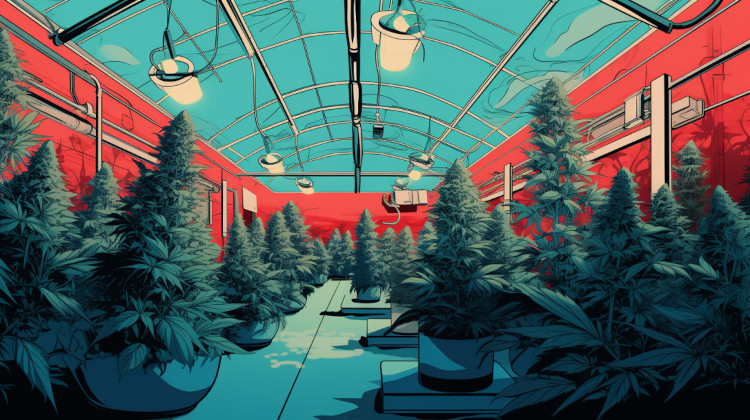
Preventing nitrogen deficiency in your weed plants is often more manageable than addressing the issue once it arises. Proactive measures can ensure your cannabis plants receive the nutrients they need for robust growth and optimal yields. After all, they say an ounce of prevention is worth a pound of cure.
1. Choose the Right Soil
Start by selecting a high-quality soil or growing medium for your cannabis plants. Soil rich in organic matter and nutrients will provide a solid foundation for healthy growth. Use soil blends designed specifically for cannabis cultivation, often containing balanced nutrient ratios.
2. Conduct Soil Testing
Regularly test your soil to assess its nutrient content and pH levels. Soil testing provides valuable insights into your soil's health and allows you to adjust nutrient inputs and pH as needed to prevent nutrient deficiencies, including nitrogen deficiency.
3. Balanced Fertilization
Implement a well-balanced fertilization regimen tailored to the growth stages of your cannabis plants. Ensure that the fertilizers you use contain adequate nitrogen and other essential nutrients. Organic growers can incorporate nitrogen-rich organic amendments into their soil.
4. Optimal pH Management
Maintain proper pH levels in your growing medium. Cannabis plants generally thrive in slightly acidic to neutral pH ranges (around 6 to 7). Regularly monitor and adjust pH levels to ensure optimal nutrient uptake.
5. Avoid Overwatering
Overwatering can lead to nutrient leaching, including nitrogen loss. Practice proper watering techniques, allowing the soil to dry slightly between watering sessions to prevent excessive runoff.
6. Adequate Drainage
Make sure your growing containers or garden beds have adequate drainage to prevent waterlogging and root rot. Proper drainage helps maintain a healthy root system, which is necessary for nutrient absorption, including nitrogen.
7. Foliar Feeding
Consider using foliar sprays containing nitrogen during the vegetative stage to provide a nutrient source directly to the leaves. This can be particularly useful if you suspect that your plants may require extra nitrogen.
8. Regular Inspection
Continuously monitor your cannabis plants for any signs of nutrient deficiencies, including nitrogen deficiency. Early detection allows for prompt intervention and correction.
9. Nutrient Supplements
Depending on your chosen cultivation method, you may want to keep nutrient supplements on hand. These can include liquid fertilizers or nutrient mixes that can be easily adjusted to meet the specific needs of your plants.
By taking these preventive measures and maintaining a vigilant approach to your cannabis garden, you can minimize the risk of nitrogen deficiency and create optimal growing conditions for your weed plants. This proactive approach promotes healthy plants and enables higher yields and better quality cannabis.
References
- Saloner A, Bernstein N. Response of Medical Cannabis (Cannabis sativa L.) to Nitrogen Supply Under Long Photoperiod. Frontiers in Plant Science. 2020;11. doi:https://doi.org/10.3389/fpls.2020.572293
↩︎ - Saloner A, Bernstein N. Nitrogen Source Matters: High NH4/NO3 Ratio Reduces Cannabinoids, Terpenoids, and Yield in Medical Cannabis. Frontiers in Plant Science. 2022;13. doi:https://doi.org/10.3389/fpls.2022.830224
↩︎ - Cockson P, Landis H, Smith T, Hicks K, Whipker BE. Characterization of Nutrient Disorders of Cannabis sativa. Applied Sciences. 2019;9(20):4432. doi:https://doi.org/10.3390/app9204432
↩︎
The information in this article and any included images or charts are for educational purposes only. This information is neither a substitute for, nor does it replace, professional legal advice or medical advice, diagnosis, or treatment. If you have any concerns or questions about laws, regulations, or your health, you should always consult with an attorney, physician or other licensed professional.

